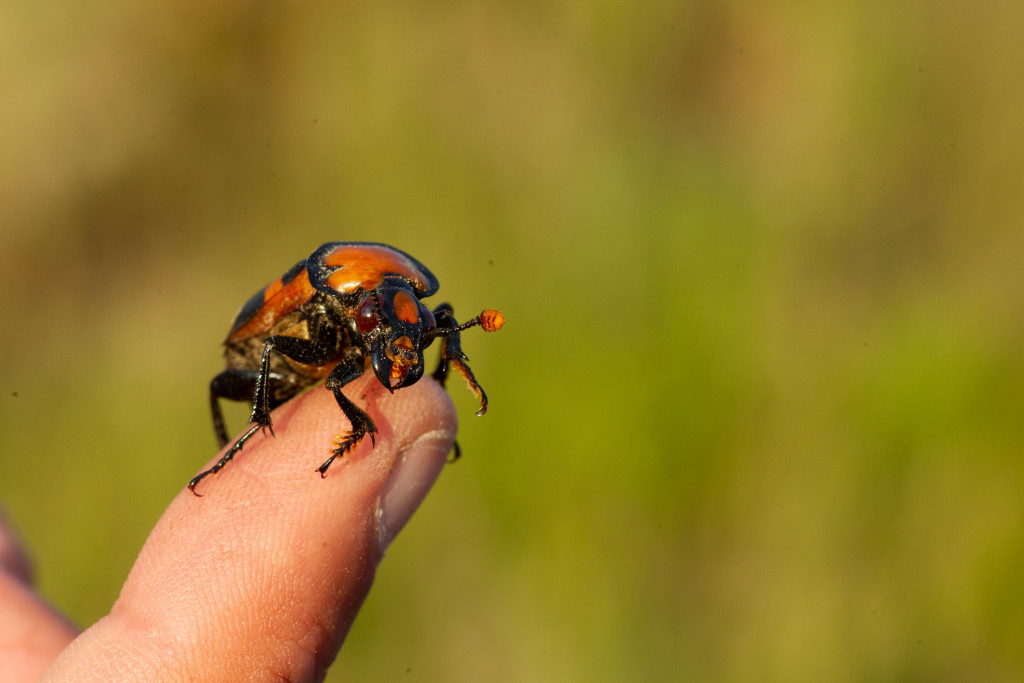One man’s waste can be a beetle’s treasure, according to Oklahoma State University entomologist Wyatt Hoback.
Who would have thought that beetles pushing dung and dead carcasses into the ground would benefit soil, livestock and even human health?
Worldwide, beneficial insects face growing threats from changes to weather patterns, natural ecosystems and the food they eat as well as unintentional exposure to insecticides. These threats have decreased the population and dispersal rate of some species by more than 90%.
When the American burying beetle buries animal carcasses, it returns nutrients to the soil and controls fly populations. The saliva the beetle uses to break down animal carcasses contains unique antibiotic and antifungal properties that could lead to new medications for humans and livestock as the world faces increased antibiotic resistance.
Dung beetles bury animal feces in the ground and use them to raise their children in their underground home. By removing the animal waste from the surface, dung beetles improve cattle grazing, improve plant growth, reduce fly populations and gas emissions, and put nitrogen and phosphorus into soil.
Hoback, professor of entomology in the OSU Department of Entomology and Plant Pathology, has not only been studying the benefits that come from the American burying beetle and the various species of Oklahoma dung beetles, but he is also trying to pinpoint what has put these important beetles in danger.
The American burying beetle, which could previously be found in 35 states but now exists naturally in only six, has been labeled as a federally threatened species. In recently published research, Hoback and Michael Cavallaro, adjunct professor in the OSU Department of Entomology and Plant Pathology, discovered that exposures to multiple common insecticides cause harm to the federally protected species.
In recent years, the United States and other nations have developed new chemical compounds to deal with insect pests, and some of these compounds are applied directly to plant seeds rather than being applied by crop duster and other surface methods.
“As the crop grows, the plant takes up some of those insecticides, and the rest of the insecticide compound stays in the soil and gets into the water and spreads into the environment,” Hoback said. “We’re not saying that treating fields with insecticides is bad; we’re just saying that we need to do more research that determines actual risks so that we can better manage the use of insecticides when needed.”
There have been studies focused on pesticide impacts on pollinators, but none have looked at the impacts on decomposer beetles that interact with the soil.
“Not only do we not have the data, but we don’t have it applied to species that are federally protected,” Cavallaro said. “We found that a single event of exposure induced a 30% death rate, and repeated exposure for 10 days induced a 50% death rate.”
Meanwhile, in continuing research, Hoback and graduate student Rodrigo Soares have studied the effects of these same insecticides on dung beetle populations. In Oklahoma and beyond, rangelands are often mixed with agricultural land, leading dung beetles to be exposed to insecticides. Managing pest flies with insecticides also contributes.
“We have found unintentional exposure to insecticides is widespread in North America, and dung beetle adults are dying from feeding on contaminated dung and from interacting with soils where seed-treated plants have been grown,” Soares said.
Moving forward, Hoback and Cavallaro will look at insecticide exposure situations that are more relevant to burying beetles by studying the soils they live in and determining the impacts to reproduction. Hoback and Soares hope to compare fly populations in areas with high dung beetle populations to see if conserving the species can reduce the need for insecticide applications.
“Insects are the base of the food chain for birds, small mammals, amphibians, bats – lots of things that people care about – and we haven’t really figured out what is driving the decline in insect numbers,” Hoback said. “If we are missing the toxic effects of insecticides that we are applying, then we don’t know that is part of what is causing the decline in insect populations. Learning about the risks to these species can improve integrated management of pests while conserving beneficial insects.”
Source - https://www.oklahomafarmreport.com













